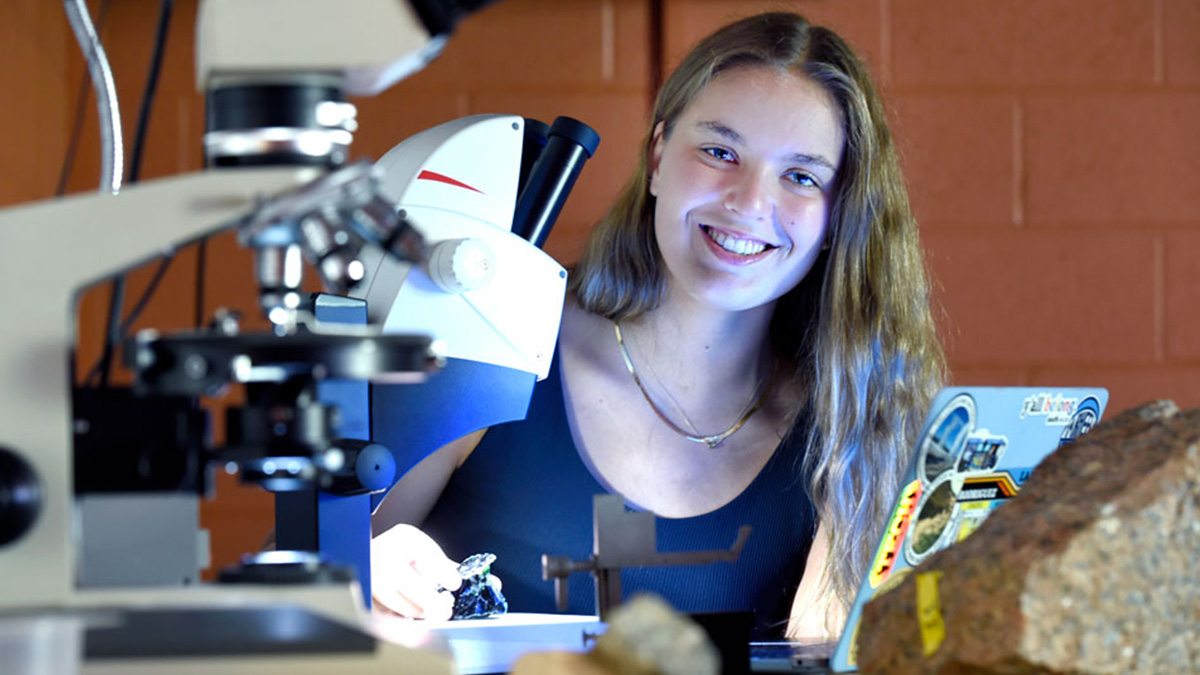Olivia Key studies seagrass
A SURF fellowship funded the junior’s living expenses for a summer of research at the Institute of Marine Sciences.

This summer, Olivia Key ’25 of Greensboro, North Carolina, spent 11 weeks conducting research at the Institute of Marine Sciences on the resilience of seagrass beds.
These beds are important to the environment for many reasons. They supply habitat for hundreds of marine species, stabilize ocean sediments and protect coastlines. But Key’s research focused on the role of seagrass in absorbing carbon from the atmosphere and storing it as a “blue carbon sink.” A “carbon sink” is anything that absorbs more carbon from the atmosphere than it releases, and “blue” describes its watery nature.
Key’s research was sponsored through the Summer Undergraduate Research Fellowship program in the Office for Undergraduate Research in the College of Arts and Sciences. The grant completely funded summer living expenses for the junior, who is majoring in geological sciences and minoring in geographic information sciences.
Describe the importance of your research.
North Carolina has the most seagrass area of any state on the U.S. East Coast. Understanding whether these beds and their stored carbon can survive storm events is important for understanding whether loss of seagrass cover will lead to loss of all the carbon accumulated in the seagrass bed. This, in turn, is important because of seagrass’ potentially valuable role in climate change and reducing net carbon emissions.
What inspired you to pursue this research project?
In spring 2023, I took a sedimentology and stratigraphy class with Dr. Antonio Rodriguez. I really loved learning about how sedimentological processes influence our world and how if you look closely enough, you can put together a story about the history of those deposits. One of the things that interests me most about geology is its applications for modern-day problems, and Ph.D. student Yasamin Sharifi’s project that involved looking at seagrass as a blue carbon sink … piqued my interest.
What advice would you give to a student interested in applying for a SURF?
Find an adviser who will be present and willing to answer questions. This was my first time conducting research on my own project and my first time working in sedimentology. I had taken a class on the subject, but that alone could not have prepared me for everything that comes with actually doing research in the field. My adviser was helpful and supportive with all of this, and that made a huge difference.
Have a good idea of what your day-to-day life will look like because if you don’t enjoy your day-to-day, 11 weeks can feel like a long time. I never pictured myself as someone who would enjoy working a 9 to 5 job, but I really enjoyed it this summer. It was such an amazing feeling to be excited to come into work every day!
What has it been like to conduct your own research for the first time?
Conducting my own research for the first time has honestly been life changing. Going into this summer I was unsure of how I felt about research: the only research experience I’d had was working on a small part of someone else’s project that I didn’t fully understand. This summer I was finally able to work on a project that was all my own where I fully understood the mechanisms and reasoning behind the research. It was very validating to get confirmation that I am on the path that I want to be on, and I can see myself doing this in the future. I think my undergraduate research experiences are the most valuable things I’ve gone through at Carolina, and I would encourage all other undergraduate students to seek out research opportunities, too.







